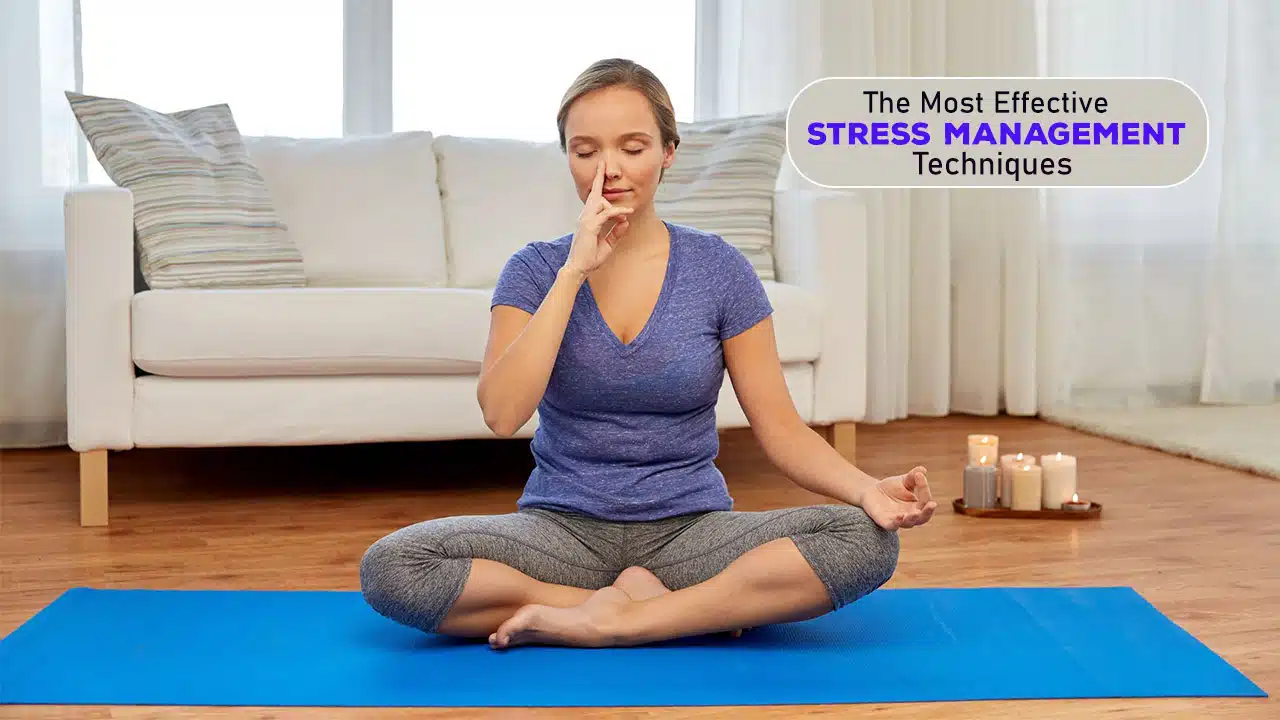In today’s fast-paced world, stress has become a constant companion for many. From the pressures of work to personal challenges, people often struggle to find peace in their daily lives. The good news is that effective stress management techniques can help you regain control and find your calm.
This article will explore various methods to reduce stress, improve mental health, and lead a more balanced life. We’ll cover many strategies, from simple breathing exercises to more complex cognitive techniques, to help you build a comprehensive stress management toolkit.
Understanding Stress
Before we dive into stress management techniques, it’s crucial to understand what stress is. Stress is the body’s natural response to challenges or demands. When we face a perceived threat, our bodies release hormones like cortisol and adrenaline.
These hormones prepare us for what’s known as the “fight or flight” response. This response can be helpful in short bursts, giving us the energy and focus to deal with immediate challenges. However, when stress becomes chronic, it can harm our physical and mental health.
Stress isn’t always bad. In small doses, it can help you perform under pressure and motivate you to do your best. But your mind and body pay the price when you’re constantly running in emergency mode. That’s why it’s essential to have effective ways to manage your stress.
Effects of Chronic Stress
Long-term stress can lead to a wide range of health issues. Here’s a more detailed look at some of the effects:
- Anxiety and depression: Chronic stress can alter brain chemistry, leading to mood disorders.
- Headaches and muscle tension: Stress often manifests physically, causing pain and discomfort.
- Digestive problems: Stress can upset your stomach, leading to issues like acid reflux or irritable bowel syndrome.
- Sleep disturbances: High-stress levels can make it hard to fall asleep or stay asleep through the night.
- Weakened immune system: Chronic stress suppresses the immune system, making you more susceptible to illnesses.
- Heart disease and high blood pressure: Stress can contribute to cardiovascular problems over time.
- Weight gain or loss: Stress can affect appetite and metabolism, leading to unintended weight changes.
- Skin problems: Stress can trigger or worsen conditions like acne or psoriasis.
- Reproductive issues: Stress can affect fertility and sexual function in both men and women.
- Cognitive problems: Chronic stress can impair memory and decision-making abilities.
Recognizing these potential effects highlights the importance of effective stress management. Now, let’s explore various techniques to help you manage stress and find calm.
Effective Stress Management Techniques
Effective stress management is essential for maintaining well-being in today’s fast-paced world.
Techniques such as mindfulness meditation, deep breathing exercises, regular physical activity, and time management can significantly reduce stress levels and improve mental health. Building strong social connections and practicing gratitude are crucial in managing stress effectively.
By incorporating these strategies into your daily routine, you can create a balanced and resilient approach to life’s challenges.
1. Mindfulness Meditation
Mindfulness meditation is a powerful tool for stress reduction. It involves focusing on the present moment without judgment. This practice can help reduce anxiety, improve focus, and promote relaxation.
How to practice mindfulness meditation:
- Find a quiet place to sit comfortably. You can sit on a chair or the floor with a cushion.
- Close your eyes and focus on your breath. Notice the sensation of air moving in and out of your body.
- When thoughts come up, notice them without judgment. Don’t try to push them away or hold onto them.
- Gently return your focus to your breath when your mind wanders. This will happen often, and that’s okay.
- Start with 5-10 minutes daily and gradually increase as you get more comfortable with the practice.
Research shows regular mindfulness practice can lower cortisol levels and reduce stress-related symptoms. A study published in the Journal of Clinical Psychology found that participants who practiced mindfulness meditation for eight weeks showed significant reductions in anxiety and depressive symptoms.
To make mindfulness a habit, try to practice simultaneously each day. Using a guided meditation app or video when you’re starting is helpful. Remember, the goal isn’t to clear your mind entirely but to observe your thoughts without getting caught up.
2. Deep Breathing Exercises
Deep breathing is a simple yet powerful technique to calm your nervous system. You can do it anywhere, at any time, to help manage stress in the moment.
Try this essential deep breathing exercise:
- Sit or lie down comfortably. If sitting, keep your back straight and let your shoulders relax.
- Place one hand on your chest and the other on your stomach.
- Breathe in slowly through your nose, feeling your stomach rise. Your chest should move only a little.
- Exhale slowly through your mouth, feeling your stomach fall. Push out as much air as you can.
- Repeat for 5-10 minutes.
Deep breathing increases oxygen flow to your brain and activates the parasympathetic nervous system, responsible for the “rest and digest” state. This helps counteract the stress response and promotes relaxation.
You can practice deep breathing in various ways. Some people find it helpful to count their breaths or use a specific pattern, like breathing in for four counts, holding for 7, and exhaling for 8. Experiment to find what works best for you.
3. Progressive Muscle Relaxation (PMR)
Progressive Muscle Relaxation involves systematically tensing and relaxing different muscle groups. This technique helps you become more aware of physical tension and learn to release it effectively.
How to practice PMR:
- Start with your toes. Tense them as tightly as possible for 5 seconds, then relax completely.
- Move up to your calves. Tighten these muscles for 5 seconds, then relax.
- Continue this process, moving up through your thighs, buttocks, abdomen, chest, arms, hands, neck, and face.
- Focus on the relaxation in each muscle group after you release the tension.
- Once you’ve gone through your whole body, take a few deep breaths and notice how relaxed you feel.
This technique can be beneficial before bed to promote better sleep. It’s also helpful in targeting specific areas of tension, like a tight neck or shoulders, after a long day at work.
Some people find using a guided PMR recording helpful when they’re first learning the technique. As you practice, you’ll become more aware of where you hold tension in your body and be able to release it more easily.
4. Regular Exercise
Physical activity is a powerful stress-buster. Exercise releases endorphins, which are natural mood boosters. It also helps reduce levels of stress hormones like cortisol and adrenaline.
Stress-reducing exercises include:
- Brisk walking: A simple, low-impact way to get moving.
- Jogging or running: Great for releasing pent-up energy and tension.
- Swimming: The repetitive motions can be meditative, and water provides resistance without impact.
- Cycling: Whether outdoors or on a stationary bike, cycling is an excellent cardiovascular workout.
- Yoga: Combines physical postures with breathing exercises and meditation.
- Dancing: Fun and expressive, dancing can boost mood and energy.
- Strength training: Lifting weights or using resistance bands can help release tension.
- Team sports: Exercise and social interaction can further reduce stress.
Aim for at least 30 minutes of moderate exercise most days of the week. Even short bursts of activity can help manage stress. For example, a 10-minute walk during your lunch break can help clear your mind and reduce stress levels.
Remember, the best exercise for stress relief is one you enjoy and will stick with. If you’re new to exercise or have health concerns, consult a doctor before starting a new fitness routine.
5. Time Management
Poor time management can lead to increased stress. It’s hard to stay calm when you feel like you’re always rushing or falling behind. Learning to prioritize tasks and manage your time effectively can reduce overwhelming feelings.
Tips for better time management:
- Use a planner or digital calendar to track tasks and deadlines. This gives you a clear overview of what must be done and when.
- Break large projects into smaller, manageable steps. This makes big tasks feel less daunting.
- Learn to say “no” to non-essential commitments. It’s okay to protect your time and energy.
- Set realistic goals and deadlines. Be honest with yourself about how long tasks will take.
- Take regular breaks to avoid burnout. Short breaks can increase productivity.
- Use the “two-minute rule”: If a task will take less than two minutes, do it immediately rather than putting it off.
- Identify your most productive hours and schedule important tasks during this time.
- Minimize distractions during work time. This might mean turning off notifications or finding a quiet workspace.
- Review and adjust your schedule regularly. Be flexible and willing to change your approach if something isn’t working.
Remember, the goal of time management isn’t to fill every minute with activity but to use your time intentionally and effectively. This includes scheduling time for relaxation and self-care.
6. Healthy Sleep Habits
Quality sleep is crucial for stress management. Lack of sleep can increase stress hormones and make you more susceptible to anxiety. On the other hand, good sleep can help you feel more resilient and better able to handle daily stressors.
Tips for better sleep:
- Stick to a consistent sleep schedule, even on weekends. This helps regulate your body’s internal clock.
- Create a relaxing bedtime routine. This might include reading, gentle stretching, or listening to calming music.
- Avoid screens for at least an hour before bed. The blue light from devices can interfere with sleep hormones.
- Keep your bedroom calm, dark, and quiet. Use earplugs, an eye mask, or blackout curtains if needed.
- Limit caffeine and alcohol intake, especially in the evening. Both can disrupt sleep patterns.
- Exercise regularly, but not too close to bedtime. Morning or afternoon exercise can promote better sleep.
- Avoid large meals close to bedtime. If you’re hungry, have a light snack.
- Manage worries by writing them down or practicing relaxation techniques before bed.
- If you can’t sleep, don’t lie in bed tossing and turning. Get up and do a quiet activity until you feel sleepy.
Aim for 7-9 hours of sleep per night to help your body and mind recover from daily stressors. If you consistently have trouble sleeping, consider talking to a healthcare provider. Sleep disorders are common and treatable.
7. Social Connection
Maintaining strong social connections can provide emotional support and help buffer against stress. Humans are social creatures, and positive relationships are essential for our well-being.
Ways to nurture social connections:
- Schedule regular catch-ups with friends and family. Even a quick phone call or video chat can boost your mood.
- Join clubs or groups related to your interests. This is a great way to meet like-minded people.
- Volunteer in your community. Helping others can give you a sense of purpose and connection.
- Reach out to a friend when you’re feeling overwhelmed. Sometimes, just talking about your stress can help.
- Consider joining a support group if you’re dealing with specific stressors. Sharing with others who understand can be very comforting.
- Practice active listening in your relationships. Focusing on what others are saying can deepen your connections.
- Show appreciation for the people in your life. Small gestures of gratitude can strengthen bonds.
- Be open to new friendships. It’s never too late to expand your social circle.
- Use social media mindfully. While it can be a tool for connection, make sure it’s enhancing, not replacing, real-world interactions.
Research shows that people with strong social support networks tend to handle stress better than those more isolated. A study published in the Annals of Behavioral Medicine found that individuals with strong social support had lower cortisol levels in response to stress.
8. Journaling
Writing down your thoughts and feelings can help you process emotions and gain perspective on stressful situations. Journaling can be a powerful tool for self-reflection and stress relief.
Journaling tips:
- Write freely without worrying about grammar or structure. The goal is expression, not perfection.
- Focus on your feelings and experiences. Describe not just what happened but how it made you feel.
- Try to write regularly, even if it’s just for a few minutes. Consistency is vital to seeing benefits.
- Review your entries periodically to identify stress patterns. You might notice triggers you weren’t aware of.
- Try different journaling techniques. Some people prefer stream-of-consciousness writing, while others like guided prompts.
- Consider a gratitude journal, where you write down daily things you’re thankful for.
- Use your journal to brainstorm solutions to problems. Sometimes, writing things out can lead to new insights.
- If you’re dealing with a specific stressor, try writing a letter to it (that you don’t send). This can help you express and process your feelings.
Remember, your journal is for your eyes only. Feel free to be completely honest and open in your writing.
9. Cognitive Restructuring
Cognitive restructuring is a technique from cognitive-behavioral therapy that involves identifying and challenging negative thought patterns that contribute to stress. Our thoughts have a powerful impact on our emotions and stress levels.
Steps for cognitive restructuring:
- Notice negative thoughts when you’re stressed. For example, “I’ll never get this done in time.”
- Question the evidence for these thoughts. Is it true that you’ll never finish? Have you managed similar tasks before?
- Look for alternative explanations or perspectives. You may be making progress, even slower than you’d like.
- Replace negative thoughts with more balanced ones. Instead of “I’ll never finish,” try “This is challenging, but I’m making progress step by step.”
With practice, cognitive restructuring can help you develop a more positive outlook and reduce stress. It’s not about forcing positivity but viewing situations more realistically and constructively.
Some common cognitive distortions to watch out for include:
- All-or-nothing thinking: Seeing things in black-and-white categories.
- Overgeneralization: Viewing a single adverse event as a never-ending pattern of defeat.
- Mental filter: Focusing solely on the negative aspects of a situation.
- Jumping to conclusions: Making negative interpretations without actual evidence.
- Catastrophizing: Exaggerating the importance of problems.
10. Nature Exposure
Spending time in nature can have a calming effect on the mind and body. It can lower stress hormones, reduce blood pressure, and improve overall well-being.
Ways to incorporate nature into your routine:
- Take a walk in a park or natural area. Even a short walk can boost your mood.
- Tend to a garden or indoor plants. Gardening can be a meditative and rewarding activity.
- Go for a hike or nature walk on weekends. This combines the benefits of nature with physical exercise.
- Spend time near the water, like a lake or beach. The sound of water can be particularly soothing.
- Bring natural elements into your home or workspace. This might include plants, natural materials, or nature photographs.
- Practice “forest bathing,” a Japanese practice of mindfully experiencing nature through all your senses.
- Watch the sunrise or sunset. This can be a peaceful way to start or end your day.
- If you can’t get outside, try nature soundscapes or virtual nature experiences.
Studies show that even brief exposures to nature can lower stress hormones and improve mood. A study published in the International Journal of Environmental Research and Public Health found that 20-30 minutes in nature can significantly lower cortisol levels.
11. Aromatherapy
Certain scents can have a calming effect on the nervous system. Aromatherapy uses essential oils extracted from plants to promote well-being.
Stress-reducing essential oils:
- Lavender: Known for its calming properties, it can help reduce anxiety and improve sleep.
- Chamomile: It is soothing and can help with relaxation and sleep.
- Bergamot: Can help reduce anxiety and improve mood.
- Ylang-ylang: May lower cortisol levels and blood pressure.
- Frankincense: Can help reduce stress and negative emotions.
- Peppermint: Can boost energy and aid concentration.
- Rosemary: May reduce cortisol levels and help with mental clarity.
Use these oils in a diffuser, add them to a bath, or apply them diluted to your skin (always check for allergies first and dilute properly). You can also simply open the bottle and inhale the scent.
While aromatherapy can be a helpful tool for stress management, it’s important to note that it should be used as a complementary approach, not a replacement for medical treatment if needed.
12. Nutrition for Stress Management
What you eat can impact your body’s stress response. A balanced diet can help stabilize mood and energy levels, making you more resilient to stress.
Stress-reducing foods:
- Complex carbohydrates: whole grains, vegetables. These foods can boost serotonin, a feel-good brain chemical.
- Omega-3 fatty acids: fatty fish, flaxseeds, walnuts. These can help reduce stress hormones and may protect against depression.
- Magnesium-rich foods: leafy greens, nuts, seeds. Magnesium regulates the nervous system.
- Probiotic foods: yogurt, kefir, sauerkraut. There’s a strong connection between gut health and mental health.
- Dark chocolate: in moderation, Contains compounds that can help reduce stress hormones.
- Berries: Rich in vitamin C, which can help lower cortisol levels.
- Avocados: Contain B vitamins that can help reduce stress.
- Warm milk: Contains tryptophan, which can help promote sleep and relaxation.
- Green tea: Contains L-theanine, an amino acid that can promote relaxation without drowsiness.
Avoid excessive caffeine, alcohol, and sugary foods, which can exacerbate stress symptoms. Caffeine can increase anxiety, alcohol can disrupt sleep patterns, and sugar can cause energy crashes that may worsen stress.
Remember to stay hydrated as well. Dehydration can increase cortisol levels and lead to fatigue and headaches, contributing to stress.
13. Mindful Hobbies
Engaging in enjoyable activities can provide a healthy distraction from stress and promote relaxation. Hobbies can give you a sense of accomplishment and help you enter a state of flow where you’re fully absorbed in what you’re doing.
Stress-reducing hobbies:
- Coloring or drawing: Adult coloring books have become famous for stress relief.
- Knitting or crochet: The repetitive motions can be meditative.
- Gardening: Connecting with nature and nurturing plants can be very calming.
- Cooking or baking: Creating something can be satisfying and stress-relieving.
- Playing a musical instrument: Music has powerful effects on mood and stress levels.
- Puzzles or board games: These can provide a mental break from stressors.
- Reading: Getting lost in a good book can be a great escape from stress.
- Crafting: Whether scrapbooking, woodworking, or jewelry making, creating something with your hands can be very satisfying.
- Photography: Focusing on capturing beautiful or exciting images can help you stay present.
- Writing: Whether it’s creative writing, poetry, or blogging, expressing yourself through words can be therapeutic.
Choose activities that you find genuinely enjoyable and absorbing. The key is to find something that allows you to focus on the present moment and take your mind off your stressors.
14. Professional Help
Sometimes, stress can become overwhelming, and it’s important to recognize when to seek professional help. There’s no shame in reaching out for support when you need it.
Signs you might benefit from professional support:
- Persistent feelings of anxiety or depression that interfere with daily life
- Difficulty functioning in daily life (e.g., trouble getting out of bed, neglecting responsibilities)
- Physical symptoms that don’t improve with self-help strategies
- Thoughts of self-harm or suicide
- Using alcohol or drugs to cope with stress
- Experiencing panic attacks
- Withdrawing from relationships or activities, you used to enjoy
- Significant changes in sleep or eating patterns
- Feeling overwhelmed by grief after a loss
A therapist or counselor can provide additional coping strategies and support tailored to your needs. They can help you identify sources of stress in your life and develop personalized strategies to manage them.
Types of therapy that can be helpful for stress management include:
- Cognitive Behavioral Therapy (CBT): Helps you identify and change negative thought patterns.
- Mindfulness-Based Stress Reduction (MBSR): Combines mindfulness meditation and yoga.
- Acceptance and Commitment Therapy (ACT): Focuses on accepting difficult emotions and committing to positive changes.
- Dialectical Behavior Therapy (DBT): Teaches skills for managing emotions and improving relationships.
Remember, seeking help is a sign of strength, not weakness. It shows that you’re taking active steps to improve your well-being.
15. Workplace Stress Management
Many people spend a significant portion of their time at work, so managing workplace stress is crucial for overall well-being.
Strategies for workplace stress management:
- Set clear boundaries between work and personal life. This might mean not checking work emails outside of work hours.
- Take regular breaks throughout the day. Even short breaks can help you recharge.
- Communicate openly with colleagues and supervisors about workload. If you’re consistently overworked, it’s essential to address this.
- Practice time management techniques. Prioritize tasks and avoid multitasking.
- Create a comfortable and organized workspace. A cluttered space can contribute to mental clutter.
- Use stress-reduction techniques like deep breathing during the workday.
- Build positive relationships with coworkers. Social support at work can be a great buffer against stress.
- Take your vacation days. Time away from work is essential for preventing burnout.
- Consider flexible work arrangements, such as remote work or flexible hours.
- Seek meaning in your work. Understanding how your role contributes to the bigger picture can increase job satisfaction.
If workplace stress overwhelms you, don’t hesitate to speak with your HR department or a career counselor.
16. Financial Stress Management
Financial worries are a common source of stress for many people. While money issues can be complex, there are strategies to manage financial stress.
Tips for managing financial stress:
- Create a budget and stick to it. Knowing where your money is going can help you feel more in control.
- Set realistic financial goals. Break them down into smaller, manageable steps.
- Build an emergency fund. Even small contributions can add up over time.
- Seek financial education or counseling if needed. Many communities offer free financial literacy programs.
- Avoid impulse purchases. Try waiting 24 hours before making non-essential purchases.
- Consider ways to increase income or reduce expenses. This might involve asking for a raise, looking for a better-paying job, or finding areas to reduce spending.
- Be honest with family or partners about financial concerns. Open communication can help you work together to find solutions.
- Avoid comparing your financial situation to others. Remember, social media often shows a curated version of people’s lives.
- If you’re in debt, create a plan to pay it off. The snowball or avalanche methods are popular debt repayment strategies.
- Remember that your wealth does not determine your worth—practice self-compassion when dealing with financial stress.
Consider speaking with a financial advisor or credit counselor if financial stress is severe. They can help you develop a personalized plan to improve your financial situation.
17. Stress Management for Parents
Parenting can be a significant source of stress. The responsibility of caring for children, along with other life demands, can feel overwhelming at times.
Here are some strategies for parents:
- Practice self-care regularly. Remember, taking care of yourself enables you to better care for your children.
- Set realistic expectations for yourself and your children. Perfectionism can be a significant source of stress.
- Establish consistent routines. This can help both you and your children feel more secure and organized.
- Seek support from other parents or family members. Don’t be afraid to ask for help when you need it.
- Take breaks when needed, even if they’re short. A few minutes of deep breathing can make a difference.
- Practice mindfulness in daily parenting activities. This can help you stay present and reduce stress.
- Make time for your relationship if you have a partner. A strong partnership can be a great source of support.
- Encourage independence in your children appropriate to their age. This can reduce your workload over time.
- Find ways to connect with your children that you enjoy. This can help balance out the more stressful aspects of parenting.
- Remember that it’s okay to make mistakes. Every parent is learning as they go.
If parenting stress feels unmanageable, consider joining a parent support group or speaking with a family therapist.
18. Stress Management for Students
Students often face unique stressors related to academic performance and future planning. The pressure to succeed and balance studies, social life, and possibly part-time work can be challenging.
Stress management tips for students:
- Develop good study habits and time management skills. Break large tasks into smaller, manageable parts.
- Practice self-care, including regular exercise and sleep. Your brain functions better when your body is well-cared for.
- Seek help from teachers or tutors when needed. Don’t wait until you’re struggling to ask for help.
- Join study groups for support and motivation. Teaching others can also reinforce your learning.
- Take breaks and engage in stress-reducing activities. Short breaks can improve focus and productivity.
- Learn and practice relaxation techniques. These can be especially helpful before exams or presentations.
- Maintain a balanced diet. Avoid relying on caffeine or junk food, especially during high-stress periods.
- Set realistic goals. Remember, perfection isn’t necessary for success.
- Practice positive self-talk. Encourage yourself the way you would encourage a friend.
- If you’re struggling with a particular subject or skill, don’t be afraid to seek extra help or accommodations.
Remember, your grades do not determine your worth. If academic stress is severely impacting your mental health, consider speaking with a school counselor or mental health professional.
19. Laughter and Humor
Laughter can be a powerful antidote to stress. It releases endorphins, reduces stress hormones, and promotes a positive mood. Laughter also has physical benefits, including boosting the immune system and relaxing muscles.
Ways to incorporate more laughter into your life:
- Watch funny movies or TV shows. Keep a list of your favorites for when you need a mood boost.
- Spend time with people who make you laugh—nurture relationships with friends with a good sense of humor.
- Read humorous books or comics. Humor comes in many forms; find what tickles your funny bone.
- Try laughter yoga. This practice involves voluntary laughter and can be done in groups or alone.
- Look for humor in everyday situations. Developing the ability to laugh at life’s absurdities can be a valuable coping skill.
- Share jokes or funny stories with friends and family. Laughter is often contagious.
- Play with children or pets. Their natural playfulness can often spark laughter.
- Attend comedy shows or improv performances. Live comedy can be incredibly engaging.
- Create a “humor first aid kit” with things that make you laugh, like funny videos or memes.
- Practice laughing at yourself (in a kind way). Being able to laugh at your own mistakes can reduce stress about them.
Remember, it’s okay to find humor even in difficult times. Laughter doesn’t mean you’re not taking a situation seriously; it can be a healthy way to cope with challenges.
20. Gratitude Practice
Focusing on your gratitude can shift your perspective and reduce stress. Gratitude helps us recognize the positive aspects of our lives, even in challenging times.
How to practice gratitude:
- Keep a daily gratitude journal. Write down three things you’re grateful for each day.
- Share three things you’re grateful for daily with a friend or family member. This can strengthen your relationships, too.
- Write thank-you notes to people who have positively impacted your life. Expressing gratitude can boost your mood and theirs.
- Practice mindful appreciation of small, everyday pleasures. Notice the warmth of sunlight, the taste of your favorite food, or the comfort of a cozy bed.
- Start or end your day by thinking of things you’re grateful for. This can set a positive tone for your day or help you wind down at night.
- Try a gratitude meditation. Focus on feelings of thankfulness during your meditation practice.
- Create a gratitude jar. Write down things you’re grateful for on slips of paper and add them to the jar. Read them when you need a boost.
- Practice turning complaints into gratitude. When you complain, try to find something to be grateful for.
- Take gratitude walks. As you walk, notice things around you that you appreciate.
- Use gratitude prompts if you’re stuck. For example, “What’s something you’re looking forward to?” or “What’s a small win you had today?”
Regular gratitude practice has been shown to improve mood, reduce stress, and enhance overall well-being. A study published in the Journal of Personality and Social Psychology found that participants who kept gratitude journals experienced greater optimism and life satisfaction.
Takeaways
Stress has become a standard part of life in today’s fast-paced and often overwhelming world. However, it doesn’t have to control your well-being. Adopting effective stress management techniques allows you to regain control and find calm amidst the chaos.
Whether through mindfulness meditation, deep breathing exercises, regular physical activity, or cultivating strong social connections, there are numerous ways to reduce stress and improve your overall mental and physical health.
It’s important to remember that stress management is a personal journey; what works for one person may not work for another. By exploring different strategies and incorporating them into your daily routine, you can build a robust toolkit for managing stress and enhancing your quality of life.
Embrace these techniques and prioritize your well-being, knowing that with the right approach, you can navigate life’s challenges with greater ease and resilience.








































